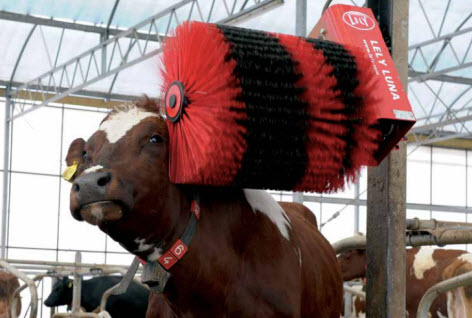World's First Floating Farm Now has Cows
32 cows have taken up residence in the world’s first floating farm in Rotterdam.
 The cows have a barn with spacious stalls and a “field,” a milk robot that the cows can choose to use, a slurry robot to collect manure, an automatic belt feeder and a massage brush.
The cows have a barn with spacious stalls and a “field,” a milk robot that the cows can choose to use, a slurry robot to collect manure, an automatic belt feeder and a massage brush.
The idea of “Floating Farm” is to bring urban dwellers as close as possible to the origin and preparation of their daily food. The farm has been transparently design, so that visitors can see what goes on. The cows produce around 800 liters of milk per day. The milk is processed into dairy products, the manure is separated and in future will be re-used as an organic and rich nutrient for the city’s plants, gardens and parks.
Wherever possible, Floating Farm is self-sufficient and circular. Floating solar panels provide for all the energy needs, rainwater is captured on the roof and then purified. Most of the cattle feed comes from the city. The menu for the cows consists of brewers’ grains, bran, potato scrapings and grass from playing fields and golf courses in the city. Upgrading waste products like grass into edible nutrients is considered a very efficient option for sustainable food production.
The background to the development of Floating Farm lies in the increasing scarcity of farmland and the growing world population. By shortening the transport of food production to consumers, the Floating Farm makes an important contribution to reducing food loss and transport-related pollution.
The project team is led by Peter van Wingerden, Carel de Vries and Johan Bosman of property development company Beladon. The team is supported by a large number of investors including Port of Rotterdam. The dairy products are for sale at Floating Farm and soon in Lidl stores in and around Rotterdam. Zegro is responsible for the wholesale operation.
Plans are now being developed for a floating chicken farm and a floating greenhouse where vegetables and herbs can be produced, all aimed at producing fresh food in a transparent way close to the consumer.
